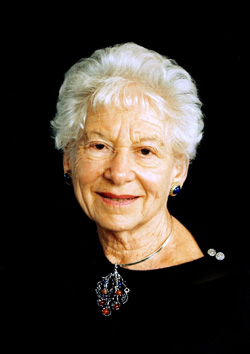
LA JOLLA, California (Press Release) — Lillian Waterman Fishman, a scientist and philanthropist who co-founded a cancer research foundation that grew to become Sanford-Burnham Medical Research Institute, died at her home in La Jolla, Calif., on August 24. She was 98.
“Lillian Fishman was a scientific trailblazer in every sense, and she was a beloved presence here at the Institute,” said Kristiina Vuori, M.D., Ph.D., Sanford-Burnham’s president and interim CEO. “Her extraordinary vision will continue to guide us as we move Sanford-Burnham into a new era of translational research advances.”
Lillian and her husband, Dr. William Fishman (1914-2001), worked side-by-side for more than 45 years to advance biomedical research. After he retired in 1976 as the first director of the Tufts Cancer Research Center in Boston, they decided to establish a new basic research institute in La Jolla.
The Fishmans launched the La Jolla Cancer Research Foundation in 1976 on a single National Cancer Institute grant of $180,000. Their founding vision of understanding disease development by investigating cell development through collaborative basic research fueled the Foundation’s growth and achievement. Renamed Sanford-Burnham Medical Research Institute in 2010, it is now one of the largest and most prestigious independent medical research institutes in the world.
As the Institute evolved, Lillian played the central role in developing active community support networks. For years, she edited the La Jolla Cancer Research Foundation newsletter and contributed articles. She was integral to building collaborations between the four Torrey Pines Mesa institutions: the Salk Institute, Sanford-Burnham, the Scripps Research Institute, and the University of California, San Diego. She remained active in the Sanford-Burnham community until the end of her life, honoring young research scientists with the annual Fishman Fund Awards and hosting a series of educational events.
In 2009, Lillian was honored as a “Woman of Dedication” by the Salvation Army’s Women’s Auxiliary. In 2010, her alma mater, the University of Alberta, awarded her their Distinguished Alumni Award, bestowed on graduates whose achievements have earned them national or international prominence.
“Lillian Fishman’s tireless dedication and pioneering spirit helped make Sanford-Burnham into the renowned center of discovery it is today,” says Malin Burnham, a longtime supporter whose generosity is reflected in the Institute’s name. “We can all find inspiration in Lillian and Bill’s efforts to better the lives of millions of people.”
Lillian Waterman was born in Calgary, Alberta on April 28, 1915. An excellent student, she enrolled at the University of Alberta in 1931. Upon graduation, she was accepted to the biochemistry program at Columbia University. However, she turned down the opportunity because it was believed at the time that there was no future for a woman in science.
She eventually enrolled in a dietetic training program at Montefiore Hospital in New York. Just after completing the program, she met William Fishman while vacationing on Lake Watrous in the province of Saskatchewan. They announced their engagement on New Year’s Eve, 1938, and soon after, William secured a position for Lillian in his laboratory at the University of Toronto. She quickly proved her aptitude in biology, devising substrates and reagents.
Lillian and William were married on August 6, 1939. Over the years, the couple spent time living in Edinburgh, New York, Winston-Salem, Chicago, and Boston. At Tufts University Medical School, William established and served as the first director of Tufts Cancer Research Center, the first regional cancer center sanctioned under the National Cancer Act signed into law by President Richard Nixon in 1971.
After 28 years at Tufts, William reached mandatory retirement age, and the couple decided to pursue their dream of creating a basic research institute. They were eager to explore the then-new field of oncodevelopmental biology, which studies the link between cancer and developmental biology.
In an April 27, 2013 U-T San Diego interview titled “Building a Foundation,” Lillian recalled the origins of their startup. “My husband chaired an International Scientific Symposium in 1975 in La Jolla,” she said. “He was so impressed with the environment and the burgeoning scientific community on the Torrey Pines Mesa, that he suggested we take a vacation out West. Little did I know that we were about to embark on a new career in our mid-sixties.”
Lillian’s own scientific output included published research papers on mammalian placental alkaline phosphatases, which demonstrated the importance of understanding normal cell development to understanding cancer development. She and William believed passionately in high-impact science conducted in a culture that fosters creativity. “Our ‘big idea’ was to create an independent medical research Institute dedicated to the emerging field of Oncodevelopmental Biology,” she told the U-T. “We wanted to hire bright young scientists and give them the freedom to do their research, unencumbered by administrative bureaucracy and departmental politics.”
Lillian is survived by her son Joel Shulem Fishman (and Rivkah Fishman), her daughter, Nina E. Fishman Attridge (and Alan Attridge), three grandchildren, and six great-grandchildren. Lillian was predeceased by her son Daniel Lewis Fishman. In lieu of flowers, the family requests that donations be made in her honor to the Fishman Fund at Sanford-Burnham.
*
Preceding provided by Sanford-Burnham Medical Research Institute in behalf of the Fishman family.